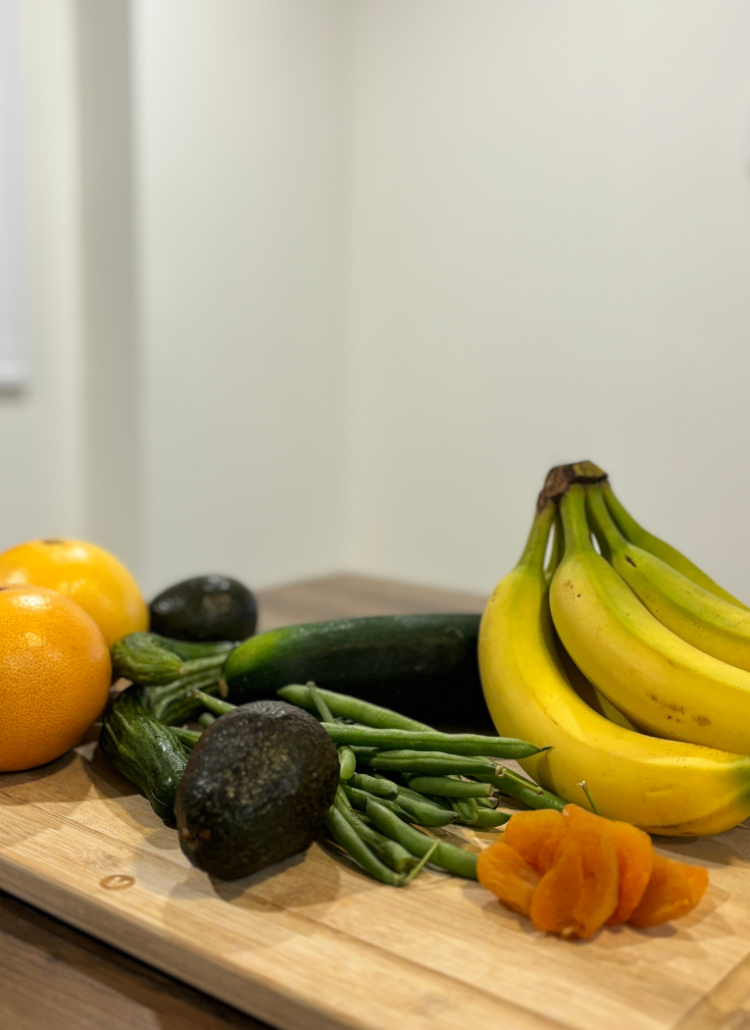In this post, I will be sharing with you the benefits of mindful eating and give you 7 extremely helpful tips you can use today to begin practicing.
This post is for informational and educational purposes only. This post should not be taken as medical advice or used as a substitute for such. We do our best to present the best and most accurate information, however, we are not a licensed medical professional. All information on this Site is from personal experience or opinion, and we are not liable for risk and issues associated with using or acting upon the information on this Site. See Terms & Conditions for further information.
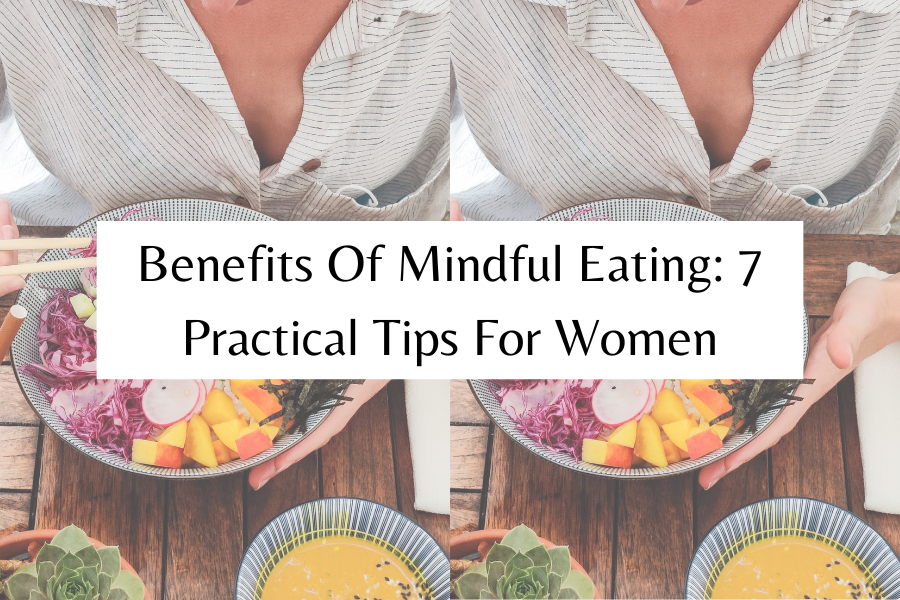
I can see it now, you get home from work, warm up that frozen dinner, and sit down in front of the TV to eat. You mindlessly scarf back all your food in seconds, only to realize you’ve eaten too much and now your stomach hurts.
This image is unfortunately all too common in our fast-paced lives.
Eating has become just another task to check off the list rather than a moment of nourishment and enjoyment. We need to focus on creating routines that allow us to slow down and enjoy our food again.
This could be a morning routine starting off with getting outside and enjoying the sunrise. Followed by making a breakfast full of love that nourishes us for hours.
Eating is such a vital part of our lives, yet it’s often overshadowed by our hectic schedules.
There are many benefits of mindful eating, one being it invites us to reconnect with the present moment. It encourages us to truly engage with our food, to savour every bite, appreciating the tastes, textures, and flavours.
It’s noticing how we chew and how each bite breaks down before we swallow.
By practicing mindful eating, we rekindle our appreciation for food and develop awareness of our body’s hunger and fullness cues.
At its core, mindful eating is about listening to our bodies and the signals it gives us.
It’s not a diet or meal plan, it’s about a balanced approach to eating.
When we practice living a slow lifestyle and embrace mindfulness during our meals we create a healthier relationship with food. This can empower you to make more informed decisions in other areas of your health and vitality.
This post is all about the benefits of mindful eating and 7 practical tips you can use today.
Benefits of Mindful Eating
There are 4 benefits of mindful eating that you can take advantage of when you start to slow down and experience your food.
1. Improved Digestion and Nutrient Absorption
Number one of the benefits of mindful eating is improved digestion!
Practicing mindfulness during meals can significantly enhance digestion and optimize the body’s nutrient absorption process.
When we approach eating with mindfulness, we activate the parasympathetic nervous system, often referred to as the “rest and digest” state.
This physiological state promotes relaxation and reduces stress, which are crucial for optimal digestion.
In this relaxed state, our bodies produce increased stomach acid and digestive enzymes, which are essential for breaking down food effectively.
Improved motility in the digestive tract is also a result of being in this relaxed state. Better motility ensures our food moves through our GI tract smoothly and efficiently.
By paying more attention while we eat, savouring flavours, and textures, and chewing thoroughly, we become more attuned to our body’s signals of hunger and fullness.
This increased awareness helps us control how much we eat, stopping us from eating too much and encouraging us to have a healthy diet.
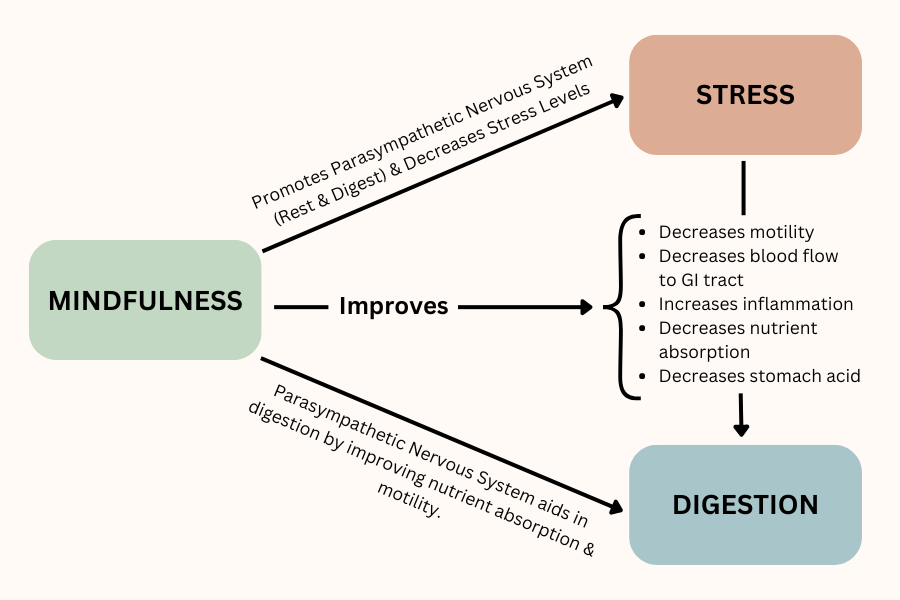
2. Creating a Better Relationship with Food
The second of the benefits of mindful eating is that it helps us foster a better relationship with our food.
For many women, including myself, our relationship with food can be complicated. We grow up in a society with numerous predetermined standards for what women should be, particularly how we should look.
This can influence how and what we eat.
Sometimes, it feels like we “should” or “shouldn’t” eat certain things to maintain our appearance. This pressure can be overwhelming and mentally harmful for many women.
Hyper-focusing on what you eat can lead to body and food disorders. I know many women who after restricting themselves too much, struggle with binge eating. Top of Form
The benefits of mindful eating are that it shifts the focus from “shoulds” and “shouldn’ts” to simply enjoying the nourishing food on your plate.
Changing your mindset from labeling foods as “good” or “bad” to eating what makes you feel good can transform your relationship with food.
Food is here to nourish us, and we need it to live. We should feel good after eating not guilty.
By slowing down and paying attention to the food you prepare and consume, you can truly savour it.
It allows you to create gratitude for the nourishment it provides your body and mind.
It’s not just about eating “healthy” foods either.
While whole, unprocessed foods are generally best, stressing less about what you eat allows you to enjoy occasional treats guilt-free, and sometimes this is more important than the extra sugar.
Embracing a balanced approach where you indulge occasionally while primarily fueling your body with nutrient-dense foods is the key to improving your overall well-being.
So, don’t hesitate to enjoy that piece of cake or those fuzzy peaches after dinner.
Mindful eating isn’t just about what’s on your plate, it’s about how you feel about what’s on your plate, creating a healthier relationship with food.
3. Mindful Eating Promotes Weight Management
Weight management is another one of the benefits of mindful eating. It’s a tool in weight management because mindful eating helps reduce overeating and enhances our ability to listen to our body’s hunger and fullness cues.
By tuning into our body’s signals we become more aware of when we’re genuinely hungry versus eating out of habit or emotion.
This helps prevent us from consuming excess calories and promotes a balanced intake that aligns with our body’s needs.
Also, because mindful eating fosters a healthier relationship with food, it helps reduce tendencies of emotional and binge eating. This is a huge area where we can overconsume, and our weight can be greatly affected.
Approaching food without judgment helps us focus more on enjoyment and nourishment. This reduces the likelihood of using food as a coping mechanism or response to stress.
This holistic approach not only supports maintaining a healthy weight but also cultivates a sustainable and positive attitude towards eating.
4. Mindful Eating Reduces Stress & Improves Well-Being
I went into this area a bit earlier when we talked about the first benefits of mindful eating, improved digestion.
As I mentioned before, when we mindfully eat, we are intentionally slowing down and focusing on the simple task of nourishing our bodies. When we do this our body feels safe and relaxed and goes into our Parasympathetic nervous system mode.
And being in the Parasympathetic nervous system reduces the stress hormone cortisol which adds to us feeling more relaxed and at peace.
This in turn improves our overall well-being because when we are relaxed our bodies and minds can address any issues that may have been getting neglected due to the energy going toward our fight of flight response.
When we are in our fight or flight mode our bodies are focusing on using all our energy to be ready to engage in protecting ourselves or fleeing the situation. It’s not relaxed and therefore won’t allow our bodies to let their guards down and rest until we tell it it’s “safe”.
Once we tell our body it is safe, it opens the space for mindfulness and allows more connection between mind and body. Allows us to connect deeper within ourselves and tune into our body which improves our health and vitality overall.
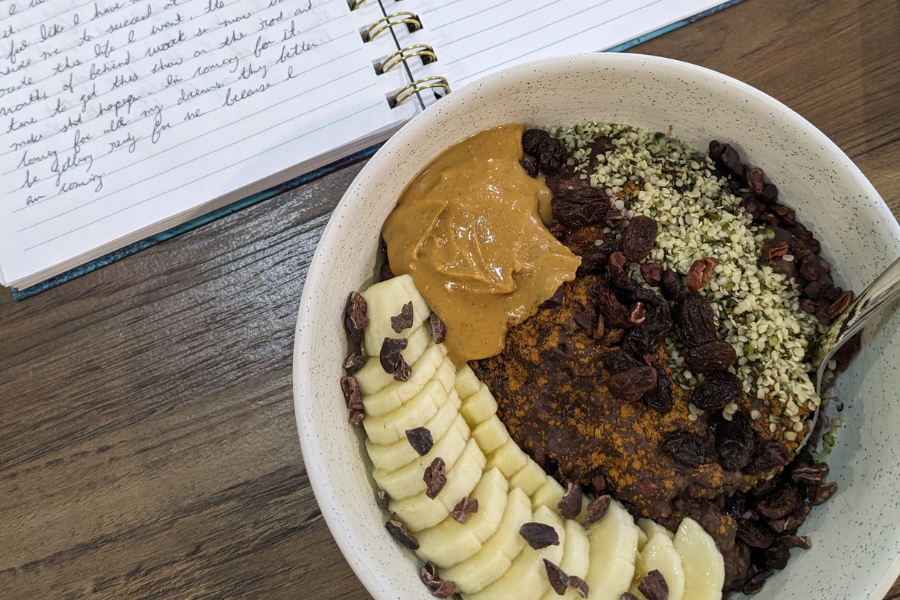
7 Tips To Practice Mindful Eating
1. Slow Down while Eating
The first tip I have for you is to slow down and savour every bite you take. Take the time to chew each bite thoroughly and notice the flavours and textures in your food.
Pretend each bite is the first time you’re trying that food. You’re extra aware of everything and all the sensations happening.
2. Listen to Your Body
One thing we need to remember is that our bodies are very smart. They know when they need food and will also tell you when they’re done, we just need to listen.
Practice before you eat to pause and ask yourself if you’re truly hungry. Make sure that the answer is yes before you eat.
Also, practice stopping periodically during your meal to see if you’re satisfied yet. Most people overeat because they don’t pause to check in, so practice pausing, checking, and then if you notice you’re no longer hungry, stop eating.
You can always save the food for your next meal. Those refrigerators in our kitchens really do wonders to keep food good until the next day
3. Minimize Distractions While You Eat
The next great tip I have for you ladies is to stop eating while watching Netflix or scrolling on your phone. When we eat while distracted that’s when we tend to overeat and that’s what we’re trying to avoid.
Even eating while working can be distracting. Practice creating a calm eating environment and give yourself the time to simply eat and enjoy your food.
And don’t worry you won’t get bored, your brain will keep you plenty busy with all its thinking.
4. Practice Gratitude for Your Food
Next time you sit down in your calm environment to eat your meal, like I said to do in tip #3… take a moment to reflect.
By starting each meal with a moment of gratitude and reflection you create a positive mindset around your food.
This also helps you appreciate what you’re eating and everything that goes into this food you’re so blessed to have in front of you.

5. Eat Mostly Nutrient-Dense Foods
Most of us love a good pizza or taco night, but let’s be honest sometimes those foods don’t provide us with the most nutrients.
Nutrients are what our bodies and our organs need to optimally function.
When you go to the grocery store try to focus on buying mostly whole, unprocessed foods. Start with getting a few of your favourite fruits and vegetables, and some good proteins. These could be cleaner animal products like beef, chicken, seafood, and eggs or vegetarian options like beans, tofu & tempeh.
And of course some good grains like rice, quinoa, oats, sourdough, or sprouted breads. These all tend to be more nutrient-packed and will help keep you full and satisfied compared to foods that have calories but are pretty nutrient-empty, like chips, white breads, candy, etc.
I always find if your kitchen is stocked with lots of healthy ingredients you can make an array of healthy dishes to last you a couple of days at a time.
6. Focus on Smaller Portions
A great way I’ve found to eat smaller portions is to serve my food on smaller plates or bowls. This way I still feel like I’m eating a full meal because my plate is “full”.
It’s an easy way to trick your brain because sometimes that’s what it takes at the beginning.
I find this helps because I know a lot of people feel the compulsory need to finish all the food on their plate otherwise, it’s wasteful. This can help get rid of that feeling. A smaller plate is much easier to finish than a bigger one.
7. Always Stay Hydrated
The last tip is to keep hydrated throughout your day! If you’re a person who tends to not drink a lot of water try to buy a cute water bottle and keep it beside you everywhere you go.
Sometimes your stomach or brain can trick you into thinking you’re hungry when actually you are just dehydrated and need some water.
So taking small sips every few minutes is the best way to keep hydrated all day. Hydration is also a key component in proper digestion and will keep things moving smoothly down there (if you catch my drift).
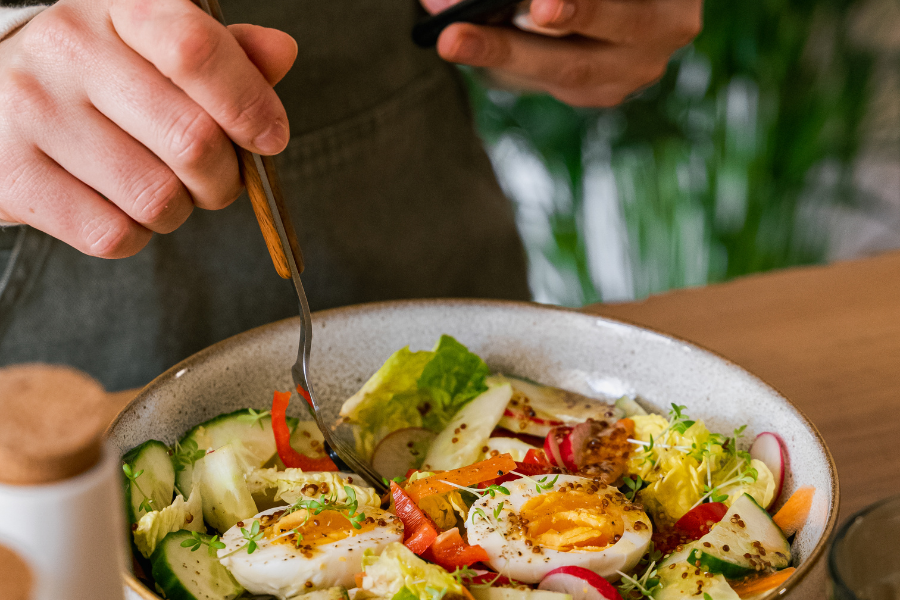
Together let’s take advantage of the benefits of mindful eating and put these amazing tips into practice every day.
Remember that mindful eating is about slowing down, savouring our food, and paying attention to our body’s signals.
Food shouldn’t be something you’re scared to eat, you should love it and enjoy cooking and eating.
I encourage you to embrace mindfulness while eating and discover how it can enhance your well-being and overall health.
Let me know if you have any questions or if you use any other tips I didn’t mention above, I always love connecting with you guys. Let’s support each other on this journey to healthier, happier life habits.



